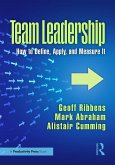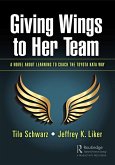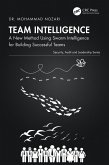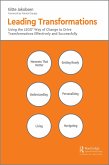Geoff Ribbens, Mark Abraham, Alistair Cumming
Team Leadership (eBook, ePUB)
How to Define, Apply, and Measure It
32,95 €
32,95 €
inkl. MwSt.
Sofort per Download lieferbar

16 °P sammeln
32,95 €
Als Download kaufen

32,95 €
inkl. MwSt.
Sofort per Download lieferbar

16 °P sammeln
Jetzt verschenken
Alle Infos zum eBook verschenken
32,95 €
inkl. MwSt.
Sofort per Download lieferbar
Alle Infos zum eBook verschenken

16 °P sammeln
Geoff Ribbens, Mark Abraham, Alistair Cumming
Team Leadership (eBook, ePUB)
How to Define, Apply, and Measure It
- Format: ePub
- Merkliste
- Auf die Merkliste
- Bewerten Bewerten
- Teilen
- Produkt teilen
- Produkterinnerung
- Produkterinnerung

Bitte loggen Sie sich zunächst in Ihr Kundenkonto ein oder registrieren Sie sich bei
bücher.de, um das eBook-Abo tolino select nutzen zu können.
Hier können Sie sich einloggen
Hier können Sie sich einloggen
Sie sind bereits eingeloggt. Klicken Sie auf 2. tolino select Abo, um fortzufahren.

Bitte loggen Sie sich zunächst in Ihr Kundenkonto ein oder registrieren Sie sich bei bücher.de, um das eBook-Abo tolino select nutzen zu können.
This work has developed the Leadership Pathway Audit(TM) that measures the effectiveness of leadership for any leader or any team and will, over time, chart how leadership changes as any factor of the leader, the team or the situation changes
- Geräte: eReader
- mit Kopierschutz
- eBook Hilfe
Andere Kunden interessierten sich auch für
![Team Leadership (eBook, PDF) Team Leadership (eBook, PDF)]() Geoff RibbensTeam Leadership (eBook, PDF)32,95 €
Geoff RibbensTeam Leadership (eBook, PDF)32,95 €![Giving Wings to Her Team (eBook, ePUB) Giving Wings to Her Team (eBook, ePUB)]() Tilo SchwarzGiving Wings to Her Team (eBook, ePUB)26,95 €
Tilo SchwarzGiving Wings to Her Team (eBook, ePUB)26,95 €![Innovation Ecosystems (eBook, ePUB) Innovation Ecosystems (eBook, ePUB)]() William B RouseInnovation Ecosystems (eBook, ePUB)37,95 €
William B RouseInnovation Ecosystems (eBook, ePUB)37,95 €![Team Intelligence (eBook, ePUB) Team Intelligence (eBook, ePUB)]() Mohammad NozariTeam Intelligence (eBook, ePUB)45,95 €
Mohammad NozariTeam Intelligence (eBook, ePUB)45,95 €![Learn to See the Invisible (eBook, ePUB) Learn to See the Invisible (eBook, ePUB)]() Michael BremerLearn to See the Invisible (eBook, ePUB)29,95 €
Michael BremerLearn to See the Invisible (eBook, ePUB)29,95 €![Leading Transformations (eBook, ePUB) Leading Transformations (eBook, ePUB)]() Gitte JakobsenLeading Transformations (eBook, ePUB)44,95 €
Gitte JakobsenLeading Transformations (eBook, ePUB)44,95 €![Make It To the Top (eBook, ePUB) Make It To the Top (eBook, ePUB)]() Payal NanjianiMake It To the Top (eBook, ePUB)29,95 €
Payal NanjianiMake It To the Top (eBook, ePUB)29,95 €-
-
-
This work has developed the Leadership Pathway Audit(TM) that measures the effectiveness of leadership for any leader or any team and will, over time, chart how leadership changes as any factor of the leader, the team or the situation changes
Dieser Download kann aus rechtlichen Gründen nur mit Rechnungsadresse in A, B, BG, CY, CZ, D, DK, EW, E, FIN, F, GR, HR, H, IRL, I, LT, L, LR, M, NL, PL, P, R, S, SLO, SK ausgeliefert werden.
Produktdetails
- Produktdetails
- Verlag: Taylor & Francis eBooks
- Erscheinungstermin: 30. Dezember 2024
- Englisch
- ISBN-13: 9781040175569
- Artikelnr.: 72284665
- Verlag: Taylor & Francis eBooks
- Erscheinungstermin: 30. Dezember 2024
- Englisch
- ISBN-13: 9781040175569
- Artikelnr.: 72284665
- Herstellerkennzeichnung Die Herstellerinformationen sind derzeit nicht verfügbar.
Geoff Ribbens MA; BSc; FCIPD; PGC ed; PGC coaching
Geoff Ribbens has lectured to postgraduate students in organisational behaviour at several universities: Thames Valley University, Bath University, Oxford Brooks University, Reading University and Birkbeck, University of London. He has considerable experience in consultancy, training, and coaching in all aspects of organisational behaviour to a wide variety of organisations both public and private. In the 1980's he was one of the first academics to move management qualification courses such as NEBSS, Certificate in Management Studies, Diploma in Management Studies, and MBA out of the university setting so they ran within organisations themselves. In more recent years he became a business development coach for Oxford Innovation Ltd and helped the development of small and medium-sized enterprises (SMEs) both in the Thames Valley and in Cornwall - European-funded programmes. Whilst working for Oxford Innovation Ltd he developed an online questionnaire (Growthmapper) to quickly identify the coaching/training needs of SMEs. Geoff Ribbens retired from Oxford Innovation Ltd and established Business Enlightenment which designs and delivers online diagnostic instruments called Pathway Audits(TM). Pathway Audits(TM) cover the identification of the strengths and development needs of organisations. One of these Pathway Audits covers Leadership, the Leadership Pathway Audit(TM) or LPA. The LPA is unique in that it has an operational definition of team leadership based on the theory that leadership is an 'emergent social property' not the property of the leader The unique approach is called Emergent Team Leadership theory (ETL). ETL means that leadership can be measured and can lead to explanations. It approaches leadership from a scientific perspective and identifies the 'necessary conditions which are jointly sufficient for leadership to emerge in teams.'
Mark Abraham OBE
After graduating from Sandhurst Mark had an operational career in the Army that included leadership roles in the UK as well as abroad. Rising to the rank of Brigadier, his earlier career saw him commanding platoons and troops in Germany and as a Commando. He was an Adjutant in the first Gulf War of 1991 and a Squadron Commander in a Mechanised Brigade. As a Lt Col, he commanded a Regiment in Iraq as well as during industrial action in the UK. His time included policy roles in the MoD, attendance at Staff College and, as a Colonel, he was a Director at the Defence Academy, teaching leadership and staff responsibilities to the Army's future leaders. He was the head of Employment for 3 years before moving back to operational delivery, becoming the COO of the Army's regional structure with responsibility for all UK regions before becoming the COO of Home Command covering all UK activity. During his career, he led work to advise the US Government on aspects of culture change and lectured the European Institute on culture change and leadership in large organisations. Mark was a member of a Business in the Community Board for 9 years and was appointed OBE for his work on culture change in 2010. He is currently a Director of Garnett Interactive and the Garnett Foundation delivering culture, leadership, and change training to large public and private sector organisations as well as, separately, delivering projects on leadership, culture, change and D&I for the NHS, Central and Local Government, Higher Education and Infrastructure Developers.
Alistair Cumming MSc; FCIPD; FHEA.
Alistair draws on over 30 years of experience in Learning and Development, organisational design and organisational change roles, working for major organisations across very different industries and cultures, including working internationally at regional and global levels. Professionally he has extensive experience of the design and delivery of training, formal and informal facilitation of groups, and coaching of individuals. As an interim Manager and Consultant, he is employed by large and small organisations helping them to implement change and build the skills and capabilities they need for the future. He now blends his time between work within business. Academia, education and the voluntary sector. His academic work includes lecturing on MSc and Level 7 programmes. LinkedIn profile at https://www.linkedin.com/in/alistaircumming/
Geoff Ribbens has lectured to postgraduate students in organisational behaviour at several universities: Thames Valley University, Bath University, Oxford Brooks University, Reading University and Birkbeck, University of London. He has considerable experience in consultancy, training, and coaching in all aspects of organisational behaviour to a wide variety of organisations both public and private. In the 1980's he was one of the first academics to move management qualification courses such as NEBSS, Certificate in Management Studies, Diploma in Management Studies, and MBA out of the university setting so they ran within organisations themselves. In more recent years he became a business development coach for Oxford Innovation Ltd and helped the development of small and medium-sized enterprises (SMEs) both in the Thames Valley and in Cornwall - European-funded programmes. Whilst working for Oxford Innovation Ltd he developed an online questionnaire (Growthmapper) to quickly identify the coaching/training needs of SMEs. Geoff Ribbens retired from Oxford Innovation Ltd and established Business Enlightenment which designs and delivers online diagnostic instruments called Pathway Audits(TM). Pathway Audits(TM) cover the identification of the strengths and development needs of organisations. One of these Pathway Audits covers Leadership, the Leadership Pathway Audit(TM) or LPA. The LPA is unique in that it has an operational definition of team leadership based on the theory that leadership is an 'emergent social property' not the property of the leader The unique approach is called Emergent Team Leadership theory (ETL). ETL means that leadership can be measured and can lead to explanations. It approaches leadership from a scientific perspective and identifies the 'necessary conditions which are jointly sufficient for leadership to emerge in teams.'
Mark Abraham OBE
After graduating from Sandhurst Mark had an operational career in the Army that included leadership roles in the UK as well as abroad. Rising to the rank of Brigadier, his earlier career saw him commanding platoons and troops in Germany and as a Commando. He was an Adjutant in the first Gulf War of 1991 and a Squadron Commander in a Mechanised Brigade. As a Lt Col, he commanded a Regiment in Iraq as well as during industrial action in the UK. His time included policy roles in the MoD, attendance at Staff College and, as a Colonel, he was a Director at the Defence Academy, teaching leadership and staff responsibilities to the Army's future leaders. He was the head of Employment for 3 years before moving back to operational delivery, becoming the COO of the Army's regional structure with responsibility for all UK regions before becoming the COO of Home Command covering all UK activity. During his career, he led work to advise the US Government on aspects of culture change and lectured the European Institute on culture change and leadership in large organisations. Mark was a member of a Business in the Community Board for 9 years and was appointed OBE for his work on culture change in 2010. He is currently a Director of Garnett Interactive and the Garnett Foundation delivering culture, leadership, and change training to large public and private sector organisations as well as, separately, delivering projects on leadership, culture, change and D&I for the NHS, Central and Local Government, Higher Education and Infrastructure Developers.
Alistair Cumming MSc; FCIPD; FHEA.
Alistair draws on over 30 years of experience in Learning and Development, organisational design and organisational change roles, working for major organisations across very different industries and cultures, including working internationally at regional and global levels. Professionally he has extensive experience of the design and delivery of training, formal and informal facilitation of groups, and coaching of individuals. As an interim Manager and Consultant, he is employed by large and small organisations helping them to implement change and build the skills and capabilities they need for the future. He now blends his time between work within business. Academia, education and the voluntary sector. His academic work includes lecturing on MSc and Level 7 programmes. LinkedIn profile at https://www.linkedin.com/in/alistaircumming/
Chapter One. The four errors that have prevented progress in our
understanding of leadership. The importance of team members perceptions
Chapter Two. Emergent Team Leadership discovered, described, and explained
Chapter Three. Case studies based on Emergent Team Leadership and the
Leadership pathway Audit(TM) Chapter Four. Features, benefits, and
practical application of Emergent Team Leadership Chapter Five. The
building blocks of Emergent Team Leadership are derived from basic social
science Chapter Six. How we arrived at the 12 key forms of influence found
in Emergent Team Leadership Chapter Seven. How other researchers have
approached the concept of leadership, their strengths, and weaknesses in
comparison to Emergent Team Leadership Chapter Eight. Political leaders
Chapter Nine. Testimonials and Final thoughts
understanding of leadership. The importance of team members perceptions
Chapter Two. Emergent Team Leadership discovered, described, and explained
Chapter Three. Case studies based on Emergent Team Leadership and the
Leadership pathway Audit(TM) Chapter Four. Features, benefits, and
practical application of Emergent Team Leadership Chapter Five. The
building blocks of Emergent Team Leadership are derived from basic social
science Chapter Six. How we arrived at the 12 key forms of influence found
in Emergent Team Leadership Chapter Seven. How other researchers have
approached the concept of leadership, their strengths, and weaknesses in
comparison to Emergent Team Leadership Chapter Eight. Political leaders
Chapter Nine. Testimonials and Final thoughts
Chapter One. The four errors that have prevented progress in our
understanding of leadership. The importance of team members perceptions
Chapter Two. Emergent Team Leadership discovered, described, and explained
Chapter Three. Case studies based on Emergent Team Leadership and the
Leadership pathway Audit(TM) Chapter Four. Features, benefits, and
practical application of Emergent Team Leadership Chapter Five. The
building blocks of Emergent Team Leadership are derived from basic social
science Chapter Six. How we arrived at the 12 key forms of influence found
in Emergent Team Leadership Chapter Seven. How other researchers have
approached the concept of leadership, their strengths, and weaknesses in
comparison to Emergent Team Leadership Chapter Eight. Political leaders
Chapter Nine. Testimonials and Final thoughts
understanding of leadership. The importance of team members perceptions
Chapter Two. Emergent Team Leadership discovered, described, and explained
Chapter Three. Case studies based on Emergent Team Leadership and the
Leadership pathway Audit(TM) Chapter Four. Features, benefits, and
practical application of Emergent Team Leadership Chapter Five. The
building blocks of Emergent Team Leadership are derived from basic social
science Chapter Six. How we arrived at the 12 key forms of influence found
in Emergent Team Leadership Chapter Seven. How other researchers have
approached the concept of leadership, their strengths, and weaknesses in
comparison to Emergent Team Leadership Chapter Eight. Political leaders
Chapter Nine. Testimonials and Final thoughts







